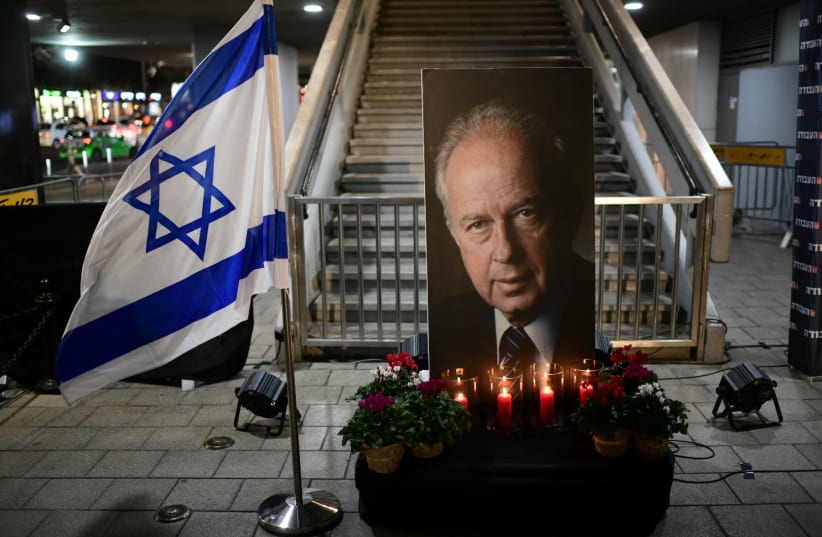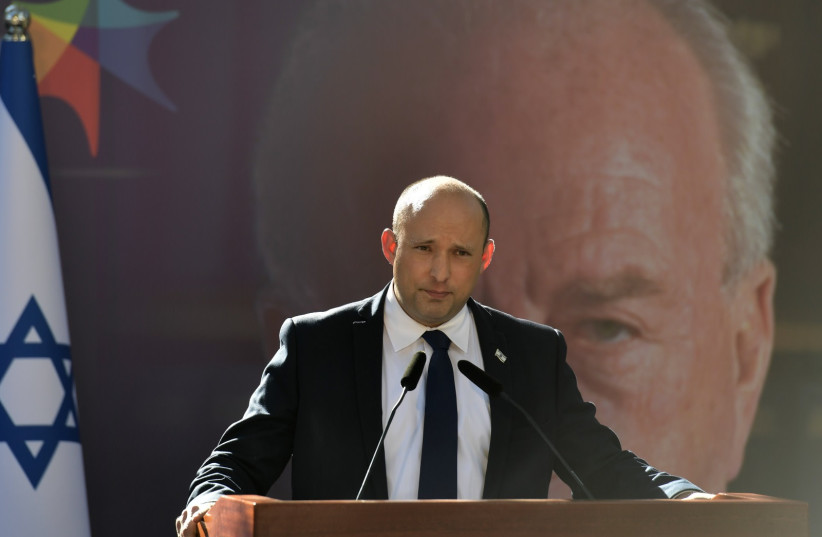Have you ever had that moment when a comment made by someone else ignites a memory in your own mind?
It happened to me on Monday afternoon.
Shortly after 5 p.m. as Prime Minister Naftali Bennett addressed the Knesset on the occasion of the 26th anniversary of the assassination of former prime minister Yitzhak Rabin, I became distracted. Not because of a lack of interest in what Bennett was saying, but because of how I just had been reminded of what Rabin once said to me.
The current prime minister stressed that the lesson of the Rabin assassination was, of course, that there are boundaries to how to conduct a political debate, but also that on the heels of the assassination, blame was placed on a broad segment of the population: the right-wing and religious. That, said Bennett, should also serve as a lesson. Such wholesale blame cannot be allowed to happen either.
Bennett said that after a period of having taken off his kippah, he put the head-covering back on after the murder of Rabin to make that point: the religious were not pariahs.
Those of us living in Israel at the time remember what that divide was like.
However, even as the Rabin assassination ignited terrible hostility from segments of the secular community, who perhaps viewed themselves as more enlightened, more liberal and the torch-bearers of peace, I suddenly remembered this past Monday as Bennett spoke, the comments that Rabin himself made to me just weeks before his life would come to a violent end.
I have spoken and written before about an encounter I had with prime minister Rabin just before Rosh Hashanah in 1995. However, when Bennett this week recalled the terrible wounds in Israeli society after November 4, 1995, a message that Rabin had relayed to me before the Jewish new year holiday that year suddenly came back to me.
Rabin had asked me about my aliyah. The former prime minister, born in the Land of Israel during the period of the British Mandate, wanted to know about my life, that of a young Orthodox Jew who lived in Brooklyn, NY, with its rich Orthodox religious infrastructure in a financially rich country but whose family gave it up to move to the State of Israel.
He didn’t question it. He believed in the modern Jewish state as the realization of the Jewish dream to return home. He fought before the establishment of the state; he was IDF chief-of-staff in the Six Day War.
When he was ambassador to the US in the years following the war, he told me, he was fascinated to hear the stories of American Jews, especially considering that the period after the Six Day War was one of a renaissance of Jewish pride, in general, and in the Jewish home, in particular, as he put it to me that day.
ON THAT day in the 1990s – in what would be my last one-on-one discussion with an historic Israeli figure whom I had interviewed several times – he relayed the following message:
He represented a generation of people who viewed themselves as “new Jews” who carried a different brand of Judaism, less of the religion but with a great attachment to the Land of the Jewish people. I, he said, was coming from a family which had a deep attachment to the religion but had lived a Diaspora life without the Jewish Land.
He thanked my family, and so many others, who were bringing those various lives together. I don’t remember too many exact quotes from that conversation. It was an impromptu encounter under random circumstances in Rabin’s office, not a formal conversation.
But I do remember that he said that my family’s aliyah allowed “two people like you and me – so different but so similar – to come together in the Prime Minister’s Office of the Jewish state and talk about where we’ve been, what we’ve done and how we got to sit on this couch together on this day.”
Rabin talked of the religious and secular needing each other. Here’s another quote that I remember: “We can’t do it without one another.”
I had tucked those comments into the back of my mind a quarter-of-a-century ago. During the years of my life in Israel, I’ve loved the interaction among the different lifestyles in our amazing country. There are so-called secular people observing Shabbat and Jewish holidays because it’s part of our common tradition. There are religious people attending concerts of so-called secular Israeli music, which sometimes even includes songs with words from our traditional texts or that speak of our ancient and modern land.
There was the time that to release my tension on Tisha Be’Av, I turned on a music radio station, but felt somewhat guilty that I was violating the rules of mourning on the tragic day and yet, the deejay then thanked anyone fasting who was also part of his listening audience. I was blown away over how he could mix the two, how the different populations could come together.
I know that I paint a grandiose picture. But as Prime Minister Bennett spoke this week and I remembered how prime minister Rabin had spoken back then, I thought to myself about how we now have a prime minister who wears a kippah and how Rabin would not have wanted his own death to tear our different sectors apart, no matter how sharp our differences may in fact be.
May the assassination always teach us a lesson and may the memory of Yitzhak Rabin bring us together to become an even better country.
The writer is op-ed editor of The Jerusalem Post.

